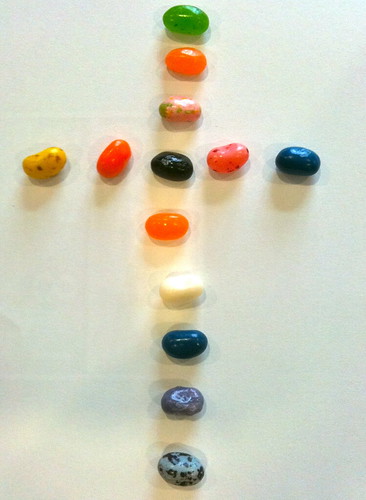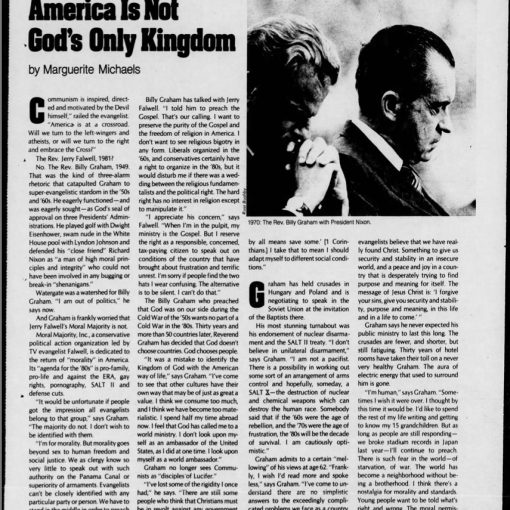 I have been a bit hesitant to share this openly on the blog since it transparently comes from current circumstances in my own life, however a recent discussion with some close friends and being shown a blog post directly on this topic at the Christian Monist has me wanting to share some thoughts with you.
I have been a bit hesitant to share this openly on the blog since it transparently comes from current circumstances in my own life, however a recent discussion with some close friends and being shown a blog post directly on this topic at the Christian Monist has me wanting to share some thoughts with you.
In the post Kids – Between Jacob and the Jelly Bean the Christian Monist questions the path on which most Evangelical parents would want their children to follow as they grow.
I think if you polled most Evangelical parents and asked them to choose one of two paths for their kids, I know the one they would choose . . . path one.
Path one, the Jelly Bean path, is where they go to church faithfully, support the pastor and elders in everything they do, they dress well, never get tattoos, never use a long list of words esteemed by Evangelicals as being bad. They never drink alcohol in case they might offend some “weaker brother” somewhere. They are very, very nice. On this path they substitute dogma for thinking. They believe what they are told to believe and never doubt it. They suppress their raw human frailties deep out of sight and never, ever mention them outside their silent thoughts, alone in their beds in the middle of the dark night of winter.
Now, as it happens, we have been having some of these discussions within our family. To preserve some sense of privacy for those involved, I will simply say that one of our children is at one of the innumerable junctions that we all face at various times in our lives with regards to the company we will keep, the culture we will adopt, and what we will believe. So CM’s comments are very relevant, particularly since I have been engaged in this very conversation with said child this week. My problem with the approach outlined by CM is that there is a false dichotomy. After presenting path one he offers path two.
The second path is messy. On this path, they think and think and think. They don’t grasp the 1,2,3 answers to every problem but feel confused, lonely, angry, horny, frustrated . . . and in distress. They encounter God and a deep visceral, almost animal-istic place. They wrestle with God . . . not disrespectful, but in the honestly of emotions. They are known to cry out, “Oh, God where the hell are you! I’m hurting down here!” Yes, sometimes they use unapproved words.
But in the end of this earthly life, those on path two do come to peace with God, having borne the scars of their struggle.
I do think there is a via media, and not just because I’m an Episcopalian. We help our children down the first path when they are young, in the sense of going to church regularly, teaching them the basics, including morals. As they get older and begin to have questions I believe we should not shut them down but allow them to think, question, and wrestle. The real problem is assuming there is only one path.
This was brought home to me this past spring when the parents of one of our students were sharing with me their child’s high school activities within the youth group of their Unitarian Universalist Church. The mother commented that, “As an adult I firmly believe in the very open view of UU, but in raising children they frankly need more direction and focus.” I am not going to make any judgments about UU, I do agree, however, that a six-year-old for example is not yet at the stage where they are going to mull any deep intellectual way about the moral ramifications of God’s declaring that Israel should destroy all the Canaanites. Some structure, some direction is needed. And if we as parents believe the Bible in some fundamental way and believe the essence of our faith in a similar manner then it is our obligation to share that faith and knowledge with our children in an age-appropriate manner.
As our children grow and develop in it is similarly incumbent upon us to grow and develop our sharing of our faith with them. When my child tells me that “I don’t want Jesus to take control of my life, I think that is wrong, I want to make my own decisions and choices have my own life” the worst thing that I could do would be to shut down the conversation and say, “No! You must accept Jesus as your Savior!” Instead I believe we need to have a discussion and be honest about our own doubts and struggles (and to admit that “letting Jesus take control of my life” doesn’t mean we won’t make our own stupid decisions!”).
My thinking on this has been informed by the words of my mentor who was counseling me through a tough time in my first year in college. The time when I had my own doubts and wrestled with God and my parents. (It just so happens is also a psychiatrist, so he has a bit of a leg up on these sorts of issues.) He said in general terms there are two kinds of parents. Those who are excellent at raising young children, and hold them close, they nurture, and they’re always there for their children. Then there are those who are good at letting their children go on their own, they give their children’s space and room to experiment and find the boundaries and even cross over them from time to time. At their best, they are also their children’s closest friends. But you can see this latter sort of parent would not be a blessing for young child at all, rather young children need structure support and nurturing. The former sort of parent, however, have difficulty letting go as their children grow and mature and need to make their own mistakes. Of course, he said, what we should strive for is to be the first sort of parent as her children are young and then make the transition with them into the latter sort. As you can see, I feel the same holds true to our spiritual rearing as well. [mfn]For those who might wonder at my word choice, I will never forget my mother saying that we “raise cattle, but rear children.”[/mfn]




6 thoughts on “How shall we rear our children?”
Educating the young…. I tell my students that child education (formally through school and informally through families and relationships) is passing along the shared beliefs of the previous generation. Really, conformity is the main goal, here. Else the kids are freaks in society and won’t get jobs. We don’t really train kids to fail out of school and become entrepreneurs; rather, we train them to be decent, mid-level cogs in the wheel.
This presents a dilemma when we want our children to think freely. How do we tell them our beliefs that we do want them to share without pressuring them to adopt these beliefs? Frankly, with my young kids, I do want to pressure them — and quite a bit — to conform to my expectations for their behavior: how they treat their siblings, how they respect their elders, etc. I allow little freedom of thought in these areas. At some point they should do more thinking for themselves, I suppose 😉 but not until I decide they’re ready!
God gave humans children so that the adults would grow up. Your children will think on their own no matter what you do and in spite of what you do. If your relationship is open they will eventually be able to share whatever they think or do with you as parents as appropriate. But don’t ask me for advice. I have too much experience to be gentle with oversimplification.
I fear that this post requires a long and nuanced response. For the record, I have experience with severe brain damage from birth – so no amount of propositional logic about the Gospel is convincing to me. Besides Saviour is misspelled – how can one put one’s trust in a Savior! Forcing conformity to a form of words is not the Gospel anyway.
BTW, re Calvinism etc, I think the number of the Elect is One. 🙂
I think your psychiatrist friend may be presenting a false dichotomy too.
We tried to set an example for them of someone who took their Christianity seriously, tried to cultivate an environment that encouraged them to think for themselves, made it clear that we loved them no matter what (I remember telling my oldest once, when he was around 18, ‘there is nothing you can do to cause me not to love you’), and tried to use teachable moments. I used Jesus as the model teacher – sometimes it wasnt perfectly clear where He was going with a statement, but there was a message there if you thought about it. We gave them a lot of freedom, not too many rules. I wanted them to know I would always be there for them, even if no one else was – they could count on me.
They are in their 20’s and 30’s now and are turning out pretty good. Click ‘about’ on my blog where I discuss them very briefly.
Just keep looking at Jesus as your model and dont get hung up on the flavor of the month gurus. Oh yeah, we talked to them like they were adults from a very early date, very early. They were read to a lot. The smarter they are, the better decisions they should make. The key to teaching is challenging without stressing.
That worked for us, and it came out of the Bible.
Have fun.
John
John, you are absolutely right and that was my friend’s point. We have a tendency to be strong in a given direction (the dichotomy), but we do not have to be bound to the extremes. The “false” notion is that we are destined to be one or the other.
Thanks, Chris, for initiating this important conversation, which from my pont of view is more about adults/teachers and less about children/students. After decades of diligently planting the seeds of regular church attendance in our 3 (now adult) sons, it’s eye opening to see that they now sow different seeds with their children. Yet, they still practice the overarching teaching of Christ to love one another. Thank God that God is still God!
Speaking from personal experience, namely my own childhood, I vote for a path where the religion is more than just a Sunday observance. It is part of everything you do, and everything you are. We do the outward things, but not for outward reasons. I made a few slip ups along the way, but that’s what repentance is for. But when parents discuss religion regularly, and express their own feelings about it regularly, it becomes a deeper commitment. Children learn by example.